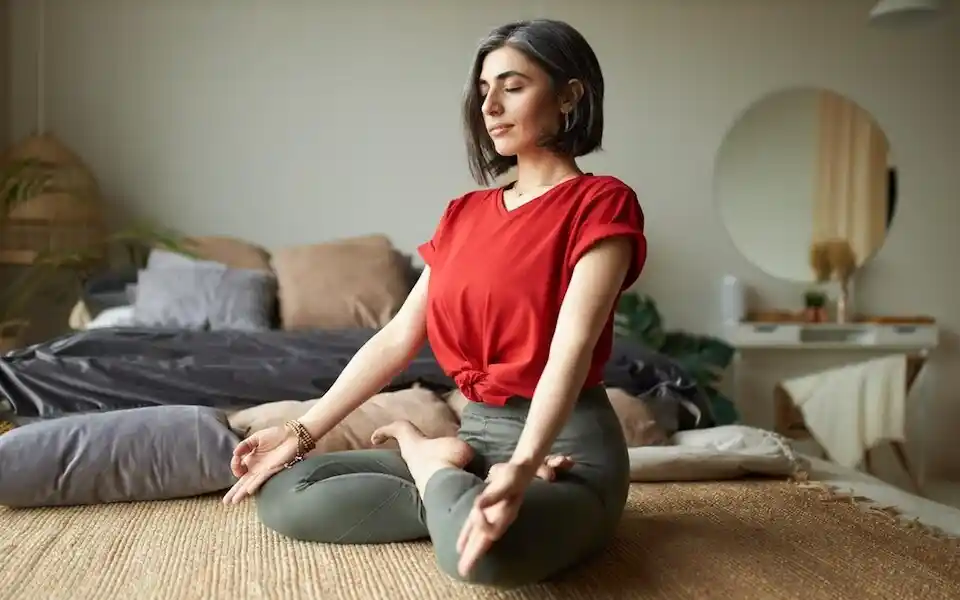Many people deal with stress and worry all the time in today’s fast-paced world. These emotions can hurt your emotional and physical health, whether they are caused by stress at work, fears about money, health issues, or relationship problems.
There are many ways to deal with worry and anxiety, but meditation is widely seen as one of the best natural ways to clear your mind and get back in balance. Meditation, on the other hand, works on more than one level. It strengthens the mind-body link and gives people the tools they need to deal with life’s stresses more quietly.
Understanding Stress And Anxiety
The body’s normal response to a challenge or danger is stress, which sets off the “fight or flight” response. Anxiety, on the other hand, is more about worrying or being afraid all the time, even if you don’t know why. Both can show up in the body as headaches, rushing thoughts, anger, or trouble focusing, and in the mind as a racing heart rate, tense muscles, or headaches.
Stress and worry that last for a long time can hurt your health in many ways, like making your blood pressure go up, giving you stomach problems, keeping you up at night, and weakening your immune system. Also, anxiety that isn’t handled can get worse and lead to sadness or panic attacks. Understanding these situations is important for picking management methods that work and don’t just give short-term help.
What Is Meditation?
Meditation is a mental practice that has roots in old cultures and is being supported more and more by modern science. To get to a state of calm awareness, you have to focus your thoughts and get rid of any distractions. The goal is not to clear your mind completely, but to be aware of your thoughts without judging them. This helps you relax and think more clearly.
Meditation comes in many forms, each with its own ways, but all based on the idea of paying attention with awareness. As an example:
- Mindfulness Meditation: The act of observing thoughts, sensations, and emotions as they emerge in the present moment.
- Guided Meditation: Following a teacher’s spoken directions, which often include visualisation or relaxation methods.
- Transcendental Meditation: To focus the mind deeply, repeat a chant or short word over and over again.
- Loving-Kindness Meditation: Developing sentiments of compassion for oneself and others.
No matter what kind of meditation you do, it helps your brain go from being agitated to calm, which makes it easier to deal with stress healthily.
How Meditation Helps Relieve Stress And Anxiety
Over the past few decades, research has shown over and over that meditation can help people who are stressed or anxious. A big reason for this is that it changes the autonomic nervous system in a way that makes the “rest and digest” parasympathetic system work and the “fight or flight” reaction less active.
Studies show that regular meditation lowers cortisol levels, which is the main stress hormone. This lowers inflammation and makes people feel better. Meditation also helps you control your emotions by making the prefrontal cortex work harder. This is the part of the brain that handles executive tasks like making decisions and controlling your impulses. This means that practitioners can handle nervous thoughts better without getting too stressed out.
Brain chemicals like serotonin and gamma-aminobutyric acid (GABA) are made more when you meditate. These chemicals are linked to feelings of well-being and calmness. This change in the body helps break the loop of worrying and dwelling on things that go wrong, which often goes along with anxiety.
Practical Meditation Techniques For Stress And Anxiety Relief
If you’re new to meditation, it’s best to start easy. Here are some methods that work:
Mindfulness Meditation
Pick a quiet spot and settle down. Close your eyes and pay attention to your breathing. Pay attention to how your chest rises and falls or how air comes in and out of your nose. If your mind wanders, kindly bring it back to the breath without judging it. Start with 5 to 10 minutes a day and slowly add more time.
Breathing Exercises
Take a slow, deep breath in through your nose for 4 seconds, hold it for 7 seconds, and then let it out slowly through your mouth for 8 seconds. Do it four times. This tells your body to relax and slows down your heart rate.
Body Scan Meditation
Feel free to lie down or sit down. Slowly bring your attention to every part of your body, starting with your toes. Pay attention to any tightness or pain you feel. Imagine the stress melting away as you breathe into those spots. This practice makes you feel deeply relaxed in your body.
Guided Meditation
You can use apps or online recordings that lead you through mantras or thoughts that will help you relax. These can be especially helpful for beginners who need help from someone else.
Tips For Building A Consistent Meditation Practice
To get the most out of meditation, you need to do it regularly. Here are some ideas:
- Create a dedicated space: Pick a place that is quiet, safe, and not near anything else.
- Set a routine: Every day, meditate at the same time, like in the morning or before bed.
- Start small: Start with 5 minutes and slowly add more time so you don’t get frustrated or burned out.
- Be patient: Minds do roam sometimes; meditation is a skill that is learned over time.
- Use resources: You can use apps like Headspace, Calm, or Insight Timer to get organised routines and prompts.
Part of the trip is getting past usual problems like nervousness or worry. Remember that meditating every day for even a short time can help.
Additional Benefits Of Meditation Beyond Stress Relief
Meditation does a lot more than just make you feel less stressed and anxious. A lot of practitioners say:
- Better sleep: Meditation calms the mind, which makes it simpler to stay asleep.
- Better focus and productivity: Being mindful helps you pay attention and clears your mind of unnecessary thoughts.
- Greater emotional resilience: Meditation promotes a balanced viewpoint, assisting people in recovering from setbacks.
- Overall health: Regular meditation helps you connect with yourself more deeply, which makes you happier and more satisfied with your life.
Conclusion
Meditation is a strong and easy way to handle the stress and worry that can be too much to handle. Meditation is good for your mental and physical health because it trains your mind to stay present and calm. It also breaks loops of stress and worry. You can learn this useful skill and feel more peaceful in your daily life if you are patient and practice it regularly. Meditation could be the answer you’ve been looking for if you want a natural way to get back in balance.

Gas S. is a health writer who covers metabolic health, longevity science, and functional physiology. He breaks down research into clear, usable takeaways for long-term health and recovery. His work focuses on how the body works, progress tracking, and changes you can stick with. Every article is reviewed independently for accuracy and readability.
- Medical Disclaimer: This content is for education only. It doesn’t diagnose, treat, or replace medical care from a licensed professional. Read our full Medical Disclaimer here.



